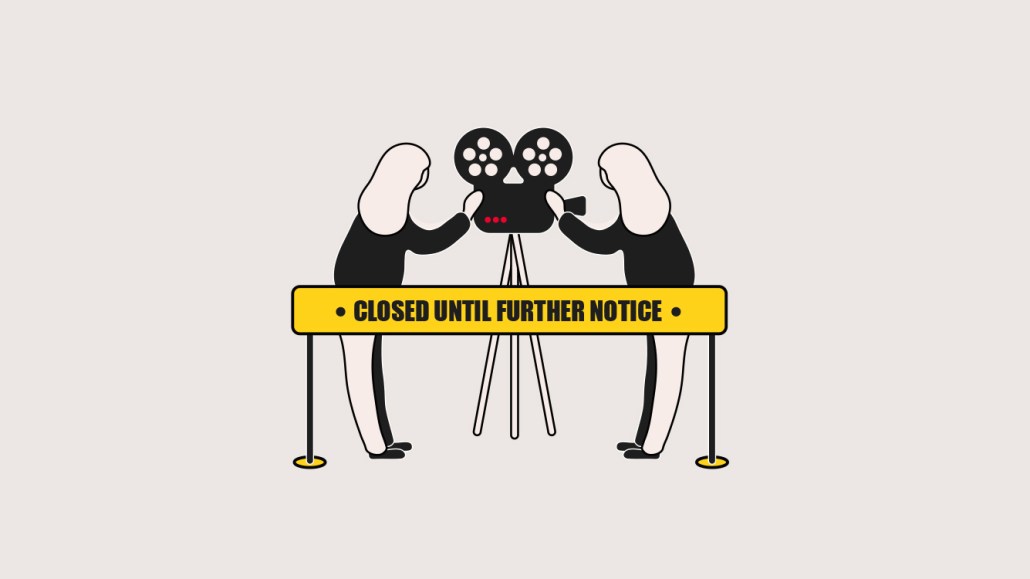Secure your place at the Digiday Media Buying Summit in Nashville, March 2-4
From Skype interviews to wire-service video: How NowThis has adapted to remote production

Video-first publisher NowThis was built around a partially remote team and content curated from other sources rounding out original reporting, so the move to remote operations was not the end of the world.
“Biggest change was not having producers in the field,” said Nico Pitney, political director of NowThis. Since social distancing mandates are keeping society at home, however, he said it’s been less of an issue because there are fewer stories that need to be captured out in the world that can’t be recorded via Skype.
The 130-person NowThis team has been taking a less buttoned-up approach to filming.
Pitney said that the quality of this content involves lower production than what the company typically produces, incorporating things like filming a laptop screen with a graphic or a video playing on it in order to visualize a talking point, versus editing in the graphic or video as b-roll during post production.
NowThis has also begun to rely more on interviews recorded using Skype. For NowThis’s “Wrongful Conviction” series, which features prison inmates and their defense teams, executive producer Matt McDonough said the process of telling the story has shifted to include more Skype calls, rather than in-person interviews.
NowThis has also been relying more on subscription services like the AP and Storyful, both to fill in the blanks when its own production team can’t collect needed content and to distribute more live-streamed content.
In February, NowThis’s main Facebook page posted 133 live videos, but in March, that number increased to 262, according to CrowdTangle. Its Politics page also increased in live video output from 339 in February to 403 in March.
“We’ve dramatically increased the amount of live content that we’re producing,” said Pitney. Every press briefing done by U.S. politicians, organization leaders and public health officials, for example, has been live-streamed on NowThis’s Facebook channel, sometimes meaning that a couple dozen take place per day for two to three hours at a time.
One series that NowThis worked hard to keep the production values high was NowThis’s daily show for Facebook, said Nancy Han, svp of news originals for NowThis. The originals team pre-recorded intros and outros in the office prior to moving remote. They also went to the show host’s home and determined which room in her apartment had the best sound quality that was most consistent with previous episodes.
While lower quality video that is shot on a smartphone or has the backdrop of someone’s messy living room can feel more relatable to audiences in this moment, Paul Greenberg, CEO of digital video firm Butter Works, said there is still a level of pre-production that can be done to provide a good balance of accessibility while also having professional credibility.
Simple things like telling the interviewee what angle to have the camera at or testing out different types of lighting can help to improve overall quality. This is especially important for evergreen content, Greenberg said, because while news is more disposable, audiences watching evergreen documentaries or series in a few months or years from now may be put off by the low quality production.
Audiences didn’t seem to mind slightly scruffier-looking videos: In March, NowThis, like most publishers, experienced a traffic boost. Total video views across all of NowThis’ YouTube, Facebook, Twitter and Instagram channels increased 49% month over month to a total of just under 1.1 billion views, according to Tubular Labs.
This post has been updated to include video views from all of NowThis’ vertical YouTube, Facebook, Twitter and Instagram channels, versus its main brand channels.
More in Media

Media Briefing: Turning scraped content into paid assets — Amazon and Microsoft build AI marketplaces
Amazon plans an AI content marketplace to join Microsoft’s efforts and pay publishers — but it relies on AI com stop scraping for free.

Overheard at the Digiday AI Marketing Strategies event
Marketers, brands, and tech companies chat in-person at Digiday’s AI Marketing Strategies event about internal friction, how best to use AI tools, and more.

Digiday+ Research: Dow Jones, Business Insider and other publishers on AI-driven search
This report explores how publishers are navigating search as AI reshapes how people access information and how publishers monetize content.





